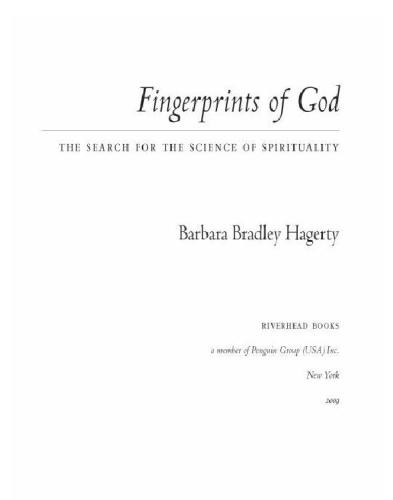
Fingerprints of God
The Search for the Science of Spirituality
کتاب های مرتبط
- اطلاعات
- نقد و بررسی
- دیدگاه کاربران
نقد و بررسی

Starred review from April 13, 2009
In her first book, National Public Radio correspondent Hagerty acts as a tour guide through the rocky terrain of scientists who study religious experience. Is there a so-called “God gene”? Why do some people have mystical experiences while others never see the so-called light? Right up front, Hagerty reveals that this is not an entirely objective exercise. As a Christian, she wants to understand her own mystical encounter with the divine and why she believes when others do not. Yet to each interview, whether with a world-renowned neuroscientist or a back-road mystic, she brings a suitably skeptical eye. Along the way, she manages to explain some pretty cutting-edge science—psychoneuroimmunology, anyone?—and unravel some people's pretty hard-to-comprehend religious experiences without sacrificing depth or complexity. Then, with equal aplomb, she dances off to peyote ceremonies, church services and Alcoholics Anonymous meetings. The real beauty of this book lies in watching Hagerty gracefully balance her own trust in faith and science and, in the end, come down with one foot planted firmly in both.

April 15, 2009
A deep spiritual quest from NPR religion correspondent Hagerty.
After renouncing Christian Science, the stoic religious heritage of her New England upbringing, Hagerty remained a spiritual seeker. She writes that she experienced numinous episodes in which she physically felt the presence of something not of this world. The author's debut is an attempt to straddle two schools of thought: reductionist materialism (voiced in the extreme by Richard Dawkins, Christopher Hitchens et al.), which denies the validity of natural phenomena yet to be explained; and organized religion (James Dobson, Pat Robertson et al.), which discourages serious inquiry into science's understanding of the brain, mind and consciousness. Hagerty offers neither church sermon nor secular argument. This is a serious journalist's courageous, ambitious investigation into what science says about"a spiritual world…that eludes physical sight and hearing and touch?" Hagerty weaves together interviews with scientists, psychologists, neurologists and dozens of people who share her metaphysical experience, including mystics, or"spiritual virtuosos." She also explores the so-called God gene, drug-induced vision quests, the neurochemistry of faith, out-of-body experiences and the psychological aftermath of near-death experiences. Ultimately, the book ends where it began, echoing psychologist and pragmatist William James, who said that science can't prove or disprove God. At best, science is agnostic. While this may be comforting for believers, Hagerty's conclusions may prove ordinary for dedicated students of science and philosophy.
A commendable, witty attempt to ground spirituality in established fact that will provide deeper understanding to people of faith but few surprises for nonbelievers.
(COPYRIGHT (2009) KIRKUS REVIEWS/NIELSEN BUSINESS MEDIA, INC. ALL RIGHTS RESERVED.)

May 15, 2009
Articles about research on spirituality and the brain are usually written from the point of view that religious experience can be understood from a purely scientific perspective. Hagerty's (religion correspondent, NPR) book does not have this naturalistic or materialistic tendency. Rather, as both a reporter and a religious person, she seeks insight on spirituality and science while being open to the possibility that spirituality may still have a transcendent component. The book is interesting to read because the author has interviewed many scientists as well as many people who attest to having mystical or near-death experiences. In a way, the reader feels like a participant in Hagerty's own encounter with the various pieces of information and evidence, struggling with her to make sense of it all. Highly recommended.John Jaeger, Dallas Baptist Univ. Lib.
Copyright 2009 Library Journal, LLC Used with permission.

























دیدگاه کاربران